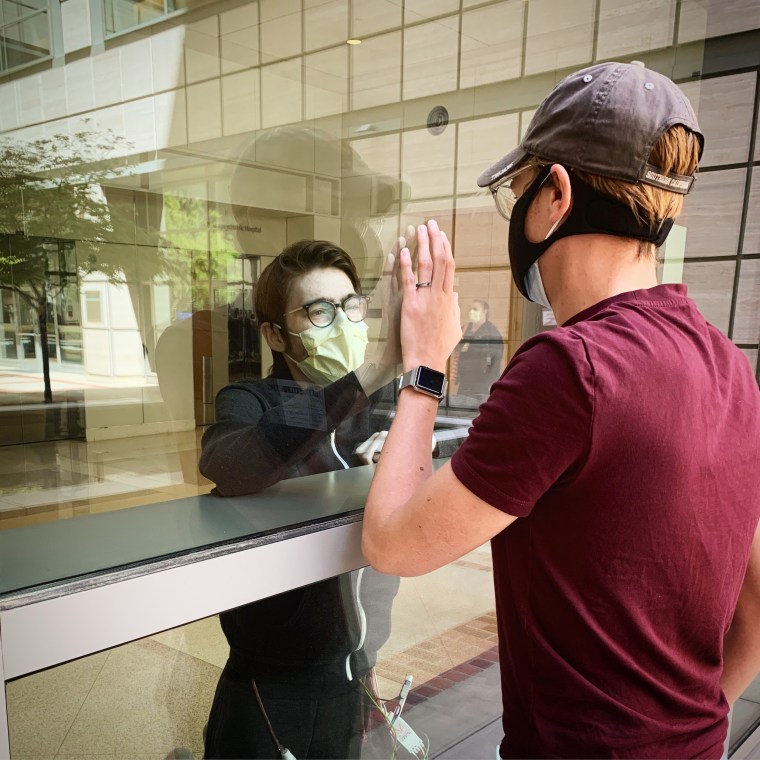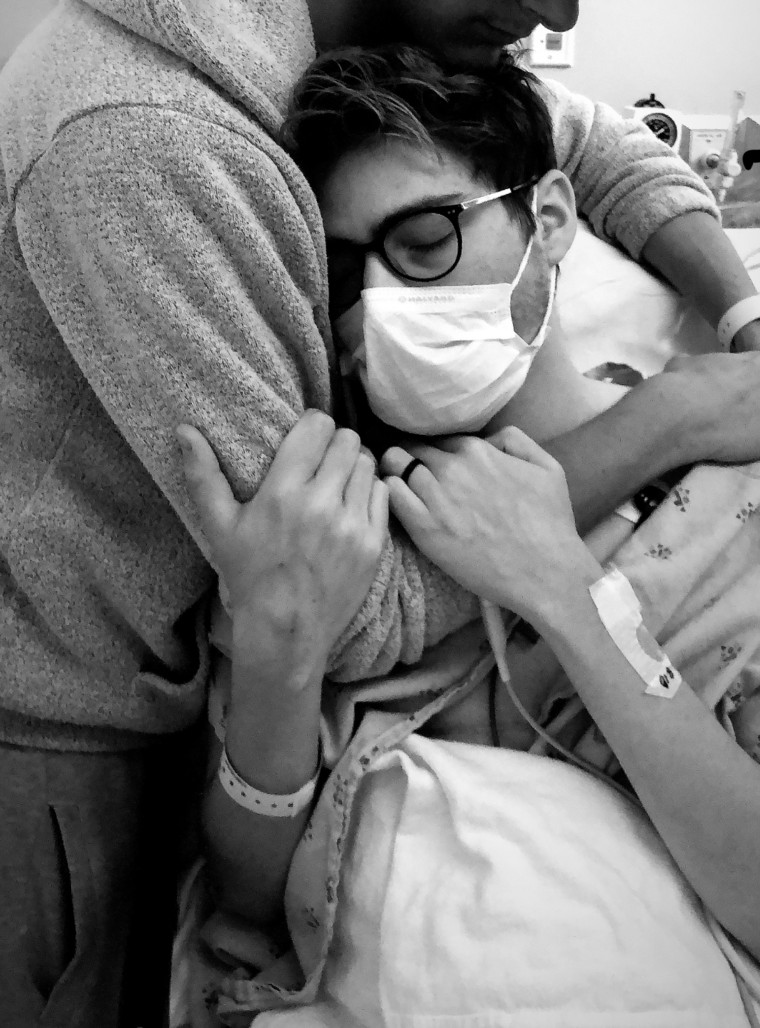When Travis Flores, 29, received his third double-lung transplant in May, his partner, Clément, was only allowed to visit once, and they were separated by a glass barrier.
“I tried my hardest to build my strength up as quickly as I could to get out of there, so that I could be with him again and be with my family again,” Flores, who spent three weeks at the UCLA Medical Center following his operation, told NBC News. “There were moments where I was so tired that I didn't think I was going to be able to keep going, but there's so many reasons to keep fighting.”
Flores, an aspiring filmmaker who lives in Los Angeles, has lived with cystic fibrosis, an inherited disorder that attacks the lungs and the digestive system, nearly his entire life. The Ohio native, who was diagnosed when he was just four months old, underwent his first lung transplant in 2015 and a second just over two and a half years later. When his body rejected the second set of lungs too, he sat on a waiting list for 13 months before he was approved for a third transplant.
“We started discussions back in March 2019, and I wasn't on the list until April 2020,” Flores said, adding that the fact that it was a third transplant complicated the surgery. “They had to put me through rigorous tests over and over."
But after an extended wait, the timing of Flores’ operation was less than ideal. The surgery was scheduled during the middle of the coronavirus pandemic, and health experts were initially concerned that people with cystic fibrosis could be at severe risk from the virus. During the three weeks Flores spent in the hospital, he was rarely allowed guests, for fear that COVID-19, the disease caused by the coronavirus, could endanger his life.

The one day that his partner, Clément, who asked that his last name not be used to protect his privacy, was permitted to visit the hospital following the transplant, they could only see each other through a window. After so much time spent apart, they attempted to comfort each other by pressing their hands together against the glass.
Flores recalled that not being able to hug Clément or to hold him proved motivating to him.
“I got out of bed faster,” he said. “I have a partner that I need to be able to dream with, to have a life with, and I have a niece that deserves to know me. I don't want to be just a picture on the refrigerator. I want her to remember me.”
Flores is one of only a handful of people to be approved for a third double-lung transplant. Last May, the Chicago Tribune reported that just 11 Americans underwent the procedure for a third time between 1995 and November 2018. Since then, there have been at least two more successful third-timers aside from Flores: 34-year-old Cassie Stanley last July and 37-year-old Tricia Lawrenson in April, both of whom have cystic fibrosis.

The reasons that it’s so rare to receive a third double-lung transplant are myriad. Many hospitals won’t perform them because of the history of organ rejection, and it can be difficult for surgeons to remove the patient’s lungs due to scar tissue built up from previous transplants.
In Flores’ case, it was difficult to get approved for the transplant through his insurance. Although he found a team willing to perform the operation at the UCLA Medical Center, Flores’ insurance company wasn’t convinced that another transplant was the right course of action, even though he would die without a new set of lungs, according to his doctors.
“It probably would have happened pretty soon, because I was headed downhill pretty quickly,” Flores said. “I was becoming more dependent on Clément. I was going to be more dependent on oxygen. I was just becoming less of a person and more of a body.”
What complicated matters is that Flores was hit by a car after leaving an appointment with his insurance company in June 2019. He left the meeting feeling hopeful that his transplant would be approved, but as he was leaving, Flores said that a driver struck him after speeding through a crosswalk too quickly, leaving him with five fractures in his spine and four broken ribs. He was in a back brace for three months.
Clément said the accident significantly delayed approval for the third transplant. He said insurance companies told Flores to come back in a few months when he was fully healed. “We're not going to crack you open in the front when you’re cracked down the back,” Clément said they told Flores at the time.
“At some point, you don’t cry over bad news,” Clément said. “You cry over good news.”
Although Clément said they received “20 no's” as the ordeal stretched on for more than a year, they eventually got the yes they needed in April. Flores captured the moment he found out that he’d been approved for surgery on video. He said that he smiled, giggled, and then “went into a euphoric state.”
“I realized that the hell that I was living was going to be over, and then I would get a chance to be with Clément and my family, to be able to watch my niece grow up a little bit more, and to be able to be a human again,” he said.
But Flores’ ordeal isn’t over yet. After a 12-hour surgery and a three-week stay in isolation, he is recovering at home but is likely to need a kidney transplant. Multiple studies have shown high rates of kidney disease and renal dysfunction in cystic fibrosis patients who have recently undergone lung transplants, and Flores’ doctors are now concerned about his kidney function.
Clément said, however, that they are getting accustomed to these setbacks, and they view them as a necessary byproduct of keeping Flores alive. “As you go through, you’re happy, but you know that it's not going to be the last one,” Clément said of their setbacks. “You never celebrate.”
For now, the couple is enjoying the ability to be together without having doctors appointments fill every moment of their day. Flores hopes to write a book at some point about his experiences, but he said he is focused on being a boyfriend and a partner, rather than a patient to be taken care of.
The last time they saw each other before last month’s transplant, Flores recalled that Clément had to hug him while Flores had an oxygen concentrator on, and he said the tubes winding their way into his nose felt like a manifestation of everything that stood between them.
“All of a sudden, the next time he holds me, I’m a new person,” Flores said. “There's nothing attached to me, and he’s not hugging an oxygen machine. It’s just us.”

